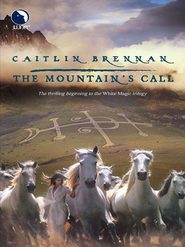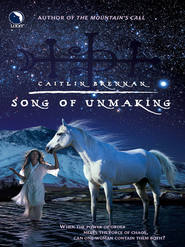По всем вопросам обращайтесь на: info@litportal.ru
(©) 2003-2024.
✖
Shattered Dance
Автор
Год написания книги
2019
Настройки чтения
Размер шрифта
Высота строк
Поля
“Her name is Grania,” Valeria said.
She was exhausted almost beyond sense, but she was alive, conscious and far from unmade. The Unmaking had subsided once more, sinking out of sight but not ever again out of mind.
Morag and two servants of the school had bathed Valeria and dressed her in a soft, light robe. Two more servants had spread clean bedding, cool and sweet-scented. Valeria lay almost in comfort and held out her hands.
Kerrec cradled their daughter, looking down into that tiny, red, pinched face, as rapt as if there had never been anything more beautiful in the world. He gave her up with visible reluctance.
“Grania,” Valeria said as the swaddled bundle settled into her arms. Maybe the child would be beautiful someday, but it was a singularly unprepossessing thing just now. She folded back the blankets, freeing arms that moved aimlessly and legs that kicked without purpose except to learn the ways of this new and enormous world.
Valeria brushed her lips across the damp black curls, breathing the warm and strange-familiar scent. “Grania,” she said again. And a third time, to complete the binding. “Grania.”
She looked up. Morag was smiling—so rare as to be unheard of. Grania had been her mother’s name. It was an honor and a tribute.
Valeria was too tired to smile back. Kerrec sat on the bed beside her. She leaned against him as she had for so many long hours. As he had then, he bolstered her with his warm strength.
She sighed and closed her eyes. Sleep eluded her, but it was good to rest in her lover’s arms with their child safe and alive and replete with the first milk.
Her body felt as if it had been in a battle. Everything from breasts to belly ached. That would pass. The Unmaking…
Despair tried to rise and swallow her. She refused to let it. She should be happy. She would be happy. That old mistake would not crush her—not now and not, gods willing, ever after.
Chapter Six
The room was full of shadows and whispers. All the windows were shrouded and the walls closed in with heavy dark hangings. But the floor was bare stone, and a stone altar stood in the center, its grey bulk stained with glistening darkness.
Maurus struggled not to sneeze. He was crowded into a niche with his cousin Vincentius. They each had a slit to peer through, which so far had shown them nothing but the altar and the lamp that flickered above it.
Nothing was going to happen tonight. Vincentius had heard wrong—there was no gathering. They had come here for nothing.
Just as Maurus opened his mouth to say so, he heard what he had been waiting for.
Footsteps, advancing deliberately, like the march of a processional. Maurus’ heart pounded in his throat.
The door opened behind the heavy sway of curtains. Maurus stopped breathing. Vincentius’s face was just visible beside him, pale and stiff. His eyes were open as wide as they would go.
This was the gathering they had come to see. When the full number had come through the door and drawn up in a circle around the altar, there were nineteen of them.
They were wrapped in dark mantles. Some hunched over as if trying to be furtive. Others stood straight but kept their cloaks wound tight.
Vincentius thrust an elbow into Maurus’ ribs. Maurus had already seen what his chin was pointing at. One of the figures nearest them had a familiar hitch in his gait.
Maurus’ brother Bellinus had been born with one leg shorter than the other. It made no apparent difference on a horse and he had not been judged unfit to inherit their father’s dukedom, but lately he had been acting odd—bitter, angry, as if he had a grievance against the world.
Maurus bit his lip to keep from making a sound and tried to breathe silently. Vincentius’ breath was loud in his ears. Any moment he expected one of the people in the circle to come looking for either or both of them.
The circle turned inward on itself. The air began to feel inexplicably heavy. Maurus’ head ached and his ears felt ready to burst.
Out of that heaviness grew a deep sound, deeper than the lowest note of an organ, like the grinding of vast stones under the earth. The floor was steady underfoot, but far down below it, Maurus thought something was stirring, something he never wanted to see in the daylight.
The circle moved, drawing together. Blades flashed in unison. Each shrouded figure bared an arm and cut swiftly across it. Blood flowed onto the already glistening stone.
Those arms were scarred with knife cuts healed and half-healed and barely scabbed over. It was true, then, what Maurus had heard. These worshippers of the unspeakable had been meeting nearly every night to make sacrifice in blood.
No one had been able to say what that sacrifice was for. Something dark was all Maurus could be sure of.
He had imagined that he could do something to save his brother from whatever it was. But hiding behind the curtain, huddled with his friend whose elder brother was also somewhere in the circle, Maurus felt the weight of despair. He was a half-grown boy with a small gift of magic. He should never have come to this place or seen what he was seeing.
The sound from within the earth grew deeper still, setting in his bones. Blood congealed on the altar. The circle began to chant.
It was all men’s voices, but they sang a descant to the earth’s rumbling. The words were not in a language Maurus knew. They sounded very old and very dark and very powerful.
They tried to creep into his mind. He pressed his hands to his ears. That barely muffled the sound, but the words blurred just enough that he could, more or less, block them out.
His skin crawled. His head felt as if he had been breathing poison. He was dizzy and sick, trying desperately not to gag or choke.
It all burst at once with a soundless roar. The earth stopped throbbing. The chant fell silent.
Above the altar with its thick shell of clotted blood, the air turned itself inside out. Maurus’ eyes tried to do the same. He squeezed them shut.
He could still see the flash of everything that was the opposite of light, of nothingness opening on oblivion. As terrified as he was, he needed to see it clearly—to know what it was. He opened his eyes, shuddering so hard he could barely stand up.
Oblivion spawned a shape. Arms and legs, broad shoulders, a head—it was a man, naked and blue as if with cold. He fell to hands and knees on the altar.
Lank fair hair straggled over his shoulders and down his back. He was so gaunt Maurus could see every bone, but there was a terrible strength in him. He raised his head.
His eyes were like a blind man’s, so pale they were nearly white. But as he turned his head, thin nostrils flaring, he made it clear that he could see. He took in the circle and the room and, oh gods, the curtains that shrouded the walls.
He must be able to see the boys hiding there. Maurus tried to melt into the wall. If there had been a way to become nonexistent, he would have done it.
The strange eyes passed on by. The pale man stepped down from the altar. He was tall, and seemed taller because he was so thin. One of the men who had summoned him held out a dark bundle that unfolded into a hooded robe.
That face and that lank hair were all the paler once the body was wrapped in black wool. The voice was surprisingly light, as if the edges had been smoothed from it. “Where is it?” he asked. “It’s in none of you here. Where are you hiding it?”
“Hiding what, my lord?” asked one of the men from the circle.
The pale man turned slowly. “Don’t play the fool. Your little ritual didn’t bring me here. Where is the maw of the One?”
The man who had spoken spread his hands. “My lord, all we are is what you see. We summoned you by the rites that were given us by—”
“Empty flummery,” the pale man said. “Great power called me. Your blood showed me the way. Now feed me, because I hunger. Then tell me what you think you can do to bring the One into this place of gods and magic.”
“We trust in you, my lord,” said the other. “The message said—”
“I was promised allies with intelligence and influence,” the pale man said. “I see a pack of trembling fools. That’s comforting in its way, I do grant you. If you’re such idiots, those we want to destroy might even be worse.”
“My lord—” said the spokesman.
The pale man bared long pale-yellow teeth. “This game we play to the end—ours or theirs. We’ve failed in the Dance and we’ve lost in battle. This time we strike for the heart.”







